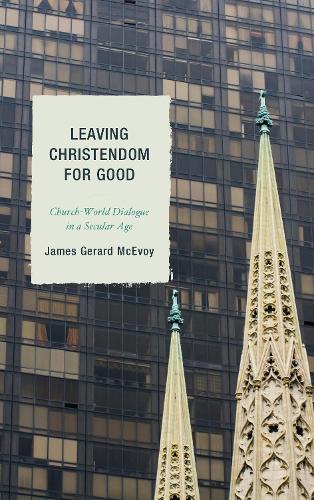
Leaving Christendom for Good: Church-World Dialogue in a Secular Age
(Hardback)
Publishing Details
Leaving Christendom for Good: Church-World Dialogue in a Secular Age
By (Author) James Gerard McEvoy
Bloomsbury Publishing PLC
Lexington Books
1st May 2014
United States
Classifications
Professional and Scholarly
Non Fiction
Religious mission and Religious Conversion
Religious social and pastoral thought and activity
266
Physical Properties
Hardback
212
Width 162mm, Height 234mm, Spine 24mm
454g
Description
Leaving Christendom for Good argues that the solution to some of the most troubling tensions in the life of the Catholic Church since Vatican II can be found in the councils document Gaudium et spes. This texts view of the churchs mission and social relationships as dialogical has the capacity to liberate. Part One studies the contemporary place of religionwith particular reference to Charles Taylors groundbreaking work, A Secular Ageand examines Gaudium et spess dialogical view of the church-world relationship. Part Two explores what true dialogue entails and how it is best understood theologically, engaging critically with Joseph Ratzingers view of the church-world relationship. The books final chapter considers two practical implications of its argument: how evangelization can be best understood today, and how the church can best approach issues in the public sphere.
Reviews
James McEvoy presents a timely and interesting look at the stance of the contemporary Roman Catholic Church towards the modern world. . . .The work could appeal to a wide audience: Catholics and other laypeople disenchanted with the unhelpful dead-end of the modern liberal-conservative dichotomy (which McEvoy criticizes); Christian clergy interested in the ecclesiological ebb-and-flow of Christianitys largest body; and those interested in the discussions around the work of Charles Taylor. . . .Leaving Christendom for Good is a helpful work that engages several important currents of thought and their representative thinkers, and ends with a reasonable diagnosis for a way forward that could appeal to wide sections of the modern Catholic Church and many sympathetic onlookers, Christian and secular. . . .[O]ne of McEvoys chief strengths is a deft ability to summarize and synthesize vast amounts of scholarship, while threading through his commentary and expounding a clear thesis. . . .[the book's] prescient reflections on modernity, evangelization, and the courage of belief today has many key pieces in place for later expansion by himself or others of what a dialogical model could mean for Catholicism in the twenty-first century. * Dialogue: A Journal Of Theology *
In a world of strident voices with fundamentalist convictions, this book speaks in a gentler tone. . . .The reader of this highly recommended book must be ready to do some serious thinking. But the rewards are worth the intellectual journey. McEvoy writes with authority when addressing all aspects of his argument. The book is full of clear explorations into complex issues, with fine syntheses and arguments that give the reader a compelling picture of hope for our contemporary world. * Australasian Catholic Record *
No one in Australia knows the work of Charles Taylor better than James McEvoy. In Leaving Christendom for Good, McEvoy not only manages to present the core arguments of Taylors A Secular Age he also offers us a rich theology of dialogue and a renewed appreciation of Gaudium et Spes as the turn to dialogue at Vatican II. . . .McEvoy does not disappoint in taking the reader on the journey of the in-depth analysis of cultural change. * Pacifica Review *
McEvoy started working on his book during the academic year 20092010, that is, at a time in the life of the Catholic Church when the books subject was unpopular: the relationship between the church and the modern world in terms of dialogue and the role of the constitution Gaudium et Spes of Vatican II (1965) in this theological debate. Now that the book is published in a Catholic environment quite different from that of 20092010, thanks to the election of Pope Francis, McEvoys book has even more to say. * Journal of Church and State *
Leaving Christendom for Good will give vital and urgently needed service to the Churchs work of evangelization in contemporary liberal culture. With great insight and careful analysis, it develops and advocates a dialogical understanding of the Church-world relationship. McEvoy transcends the superficial polarities of liberal versus conservative and highlights the rich potential of Vatican IIs Gaudium et spes to give the Catholic tradition new life in a changed world. -- Robert Gascoigne, Australian Catholic University
Leaving Christendom for Good exemplifies first-rate scholarship: it is comprehensive in its research and analysis; it is accessible in its expression; it is generous in its assessments of contrary opinions; and it is thought-provoking in its proposals. In promoting a commitment to dialogue as the means by which the church might engage constructively with the contemporary world, James McEvoy develops an argument that is insightful, nuanced, and hope-filled. This is a book that will enrich its readers. -- Richard Lennan, Boston College
McEvoy helps lay bare the core divisions in the post-conciliar church that continue to plague Catholicism to this day. His incisive study engages not only theological and historical perspectives, but also social analysis, with the work of philosopher Charles Taylor featuring prominently throughout. Leaving Christendom for Good charts the emergence of a new paradigm for church-world relations and commends the dialogical vision of Gaudium et spes as encapsulating the heart of the faith itself and continuing to offer a way forward for the church-world dynamic in our times and beyond. It is a creative, intelligent, and thought-provoking study that will inform discussions in the university, church, and wider society alike. -- Gerard Mannion, Georgetown University
Author Bio
James Gerard McEvoy is senior lecturer in the Faculty of Theology and Philosophy at Australian Catholic University.
